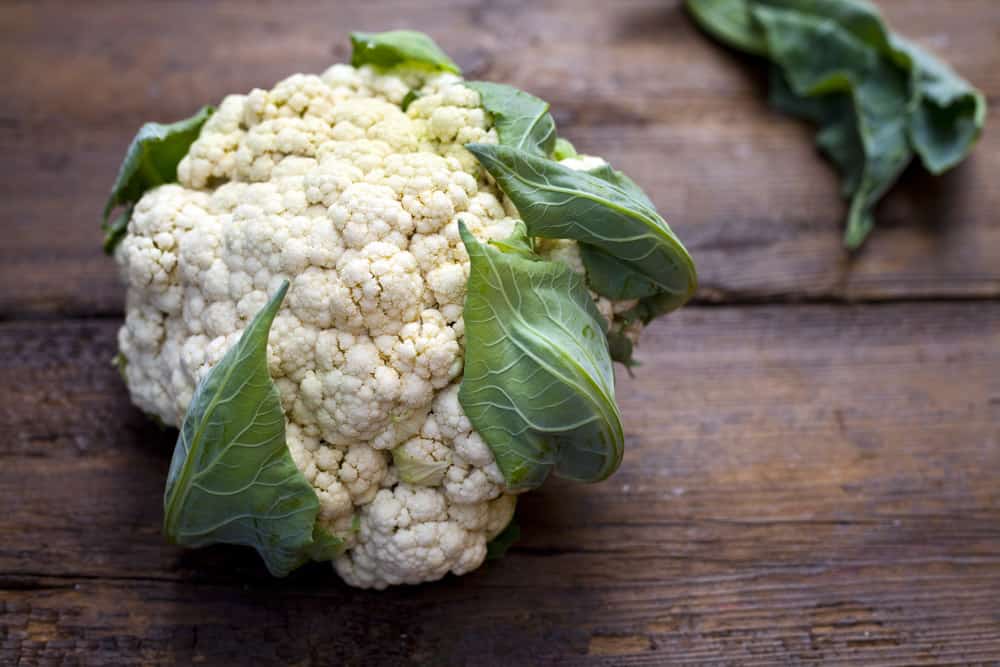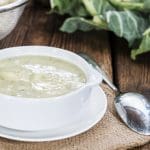Cauliflower Facts:

Nutrition Facts
Serving Size 1 Cup
Servings Per Container 1
Amount Per Serving
Calories 25
Calories from Fat 0
% Daily Value*
Total Fat 0g
0%
Saturated Fat 0g
0%
Trans Fat 0g
Cholesterol 0mg
0%
Sodium 30mg
1%
Total Carbohydrate 5g
2%
Dietary Fiber 3g
12%
Sugars 2g
Protein 2g
Vitamin A
0%
Vitamin C
77%
Calcium
2%
Iron
2%
Vitamin K
20%
Thiamin
4%
Riboflavin
4%
Niacin
3%
Vitamin B6
11%
Folate
14%
Pantothenic Acid
7%
Magnesium
4%
Phosphorus
4%
Potassium
9%
Zinc
2%
Copper
2%
Manganese
8%
Selenium
1%
*Percent Daily Values are based on a 2,000 calorie diet. Your daily values may be higher or lower depending on your calorie needs.
PQ (Protein Quality) x PDCAAS (Protein Digestibility Corrected Amino Acid Score) - 75
Additional Contents
- rutin
- lutein
- thiols
- indoles
- flavonols
- quercetin
- zeaxanthin
- ferulic acid
- caffeic acid
- kaempferol
- phytosterols
- thiocyanates
- sulforaphane
- beta-carotene
- cinnamic acid
- glucobrassicin
- glucoraphanin
- isothiocyanates
- indole-3-carbinol
- beta-cryptoxanthin
- hydroxycinnamic acids
- complex carbohydrate
Potential Health Benefits
- powerful anti-cancer properties
- powerful free radical scavenger
- anti-inflammatory properties
- cardiovascular health boost
- lower "bad" cholesterol
- digestive health boost
- stimulate detox
- energy boost
Potential Athletic Benefits
- Good source of complex carbohydrates to provide for long term energy demands.
- Support testosterone production which translates into faster muscle building and more exercise energy.
- Vision support for high-speed, high-agility sport disciplines.
- Help reduce cancer risk from excessive exposure to free radicals and body stress.
Glycemic Index Rank
15 out of 100
| Rank | Value |
|---|---|
| Low Glycemic | less than 55 |
Food Sensitivity Rank
0.9 to 1 ratio
| Rank | Value |
|---|---|
| Low for Fructose Sensitivity | less than 1 (fructose to glucose ratio) |
Cauliflower is a very prominent vegetable due to its vast profile of essential vitamins, minerals, phytochemicals, and antioxidants. It is an excellent complex carbohydrate source, and provides the body with hormonal support for testosterone production. Cauliflower also carries powerful anti-cancer properties.
- Beta-Cryptoxanthin as a Source of Vitamin A
- Cruciferous Vegetables and Human Cancer Risk
- Intake of Cruciferous Vegetables Modifies Bladder Cancer Survival
- Cruciferous Vegetable Intake is Inversely Associated with Lung Cancer Risk Among Smokers
- Role of Reactive Oxygen Intermediates in Cellular Responses to Dietary Cancer Chemopreventive Agents

876kcal/serving

beta-cryptoxanthin
is a class of carotenoid that is found in many fruits and vegetables. Its strong antioxidant properties may be responsible for being excellent at scavenging free radicals in the body and protecting DNA from damage. Studies have shown that beta-cryptoxanthin may potentially help reduce the risk of lung cancer by up to 30%, while also rheumatoid arthritis by up to 41%.
Sources include: USDA
***All-Body Fitness takes no responsibility for the accuracy of the information provided above. Please contact a medical doctor or a registered dietitian for nutrition advice.



